-
Not to Perish: Peter Sellars on Hercules, Handel's poignant examination of psychic breakdown
By Danielle D'OrnellasPosted in HerculesBy Nikita Gourski, Development Communications Officer
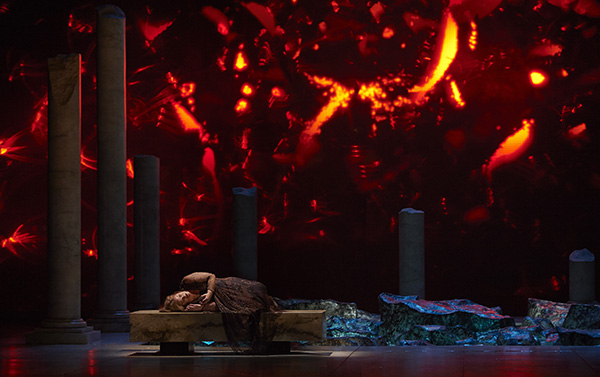
“We have art so that we might not perish from the truth.” Friedrich Nietzsche
“There’s an idea that opera is some useless entertainment for rich people and has no larger civic function,” notes American director Peter Sellars. “And for me it’s really the opposite.”
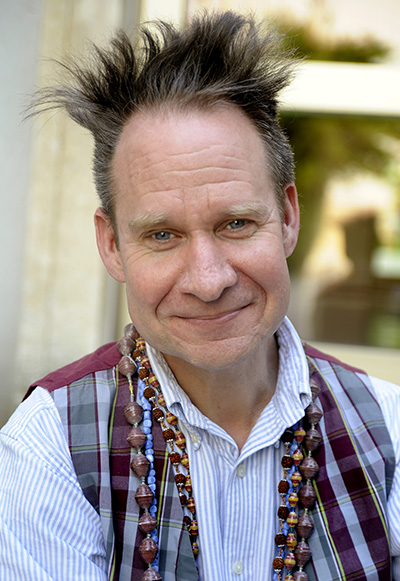 Born in Pittsburgh, Pennsylvania
and educated at Harvard University,
Sellars first captured the public’s
attention with a 1981 production of
Handel’s Orlando, which he set in
the milieu of the U.S. space program
on Cape Canaveral. Two years later
he was awarded the MacArthur
Fellowship, colloquially known as the
“Genius Grant.” He was 25 years old.
Born in Pittsburgh, Pennsylvania
and educated at Harvard University,
Sellars first captured the public’s
attention with a 1981 production of
Handel’s Orlando, which he set in
the milieu of the U.S. space program
on Cape Canaveral. Two years later
he was awarded the MacArthur
Fellowship, colloquially known as the
“Genius Grant.” He was 25 years old.Since then, Sellars, who in addition to directing opera, theatre and film, is a professor in UCLA’s World Arts and Culture Department, has fascinated North American and European audiences with his unorthodox stagings. Some of his early efforts – notably the trilogy of Mozart/ Da Ponte operas (Don Giovanni, Così fan tutte, and Le nozze di Figaro) which he set, respectively, in a New York City ghetto, a seaside diner, and Trump Tower – were viciously attacked by certain operagoers and critics.
But the passage of time has allowed for a more thoughtful, and overwhelmingly positive, assessment of his work to emerge. “That people seemed eager to write off Sellars as an enfant terrible attempting to shoehorn opera into a pair of Nikes,” wrote Adam Wasserman in Opera News two years ago, “was likely the result, I think, of his ideas hitting uncomfortably close to home.”
But if Sellars has sought to put audiences in touch with the moral tensions and social problems of their day, it’s because his overarching ambition has been to rejuvenate theatre as an arena for political consciousness, to let opera speak to our society with the same invigorating immediacy as Greek drama did for the ancient Athenians. In the words of scholar Julian Young, the tragic festival in ancient Greece “was a sacred occasion on which the community was gathered into a clarifying affirmation of its fundamental ethos – that which made it the community it was.” You did not, in other words, attend the theatre to escape the world, but to see it more clearly; not to forget yourself, but to discover your membership in the political body; not to divert your attention from problems, but to participate in the search for answers.
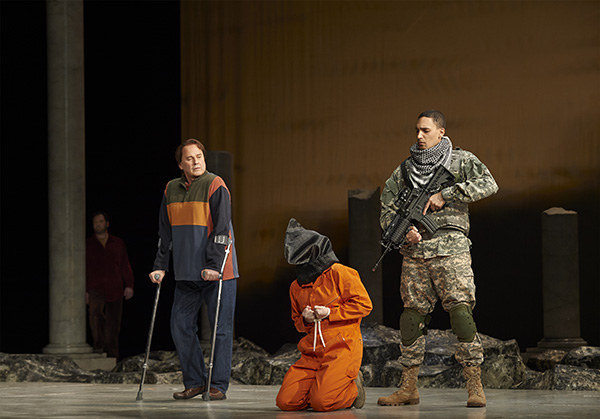
With the new COC production of Handel’s Hercules, built in collaboration with Lyric Opera of Chicago, Sellars is as adventurous as ever in pursuing that project. He sees in Hercules an examination of what we now call post-traumatic stress disorder; in less medically precise terms, the heartbreaking tangle of problems faced by returning soldiers and their families. He invites modern reality into the opera house, not to give the production a novel gloss, but to release the universal elements of Handel’s work within a grid of contemporary signs: battle fatigues; Abu-Ghraib orange jumpsuits; flagdraped coffins – and to emphasize that the social and psychological toll of warfare isn’t a bygone relic but an everyday reality.
“We’re now beginning to talk about this, because the situation in the United States is that one out of three homeless persons is a veteran,” Sellars says. “You have people whose lives have been so destroyed, whose capacity to live a meaningful life has been so devastated, who have everything stacked against them, even though they served [their country].”
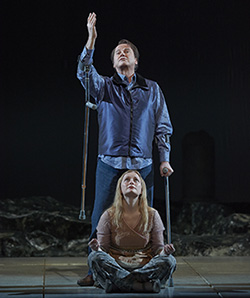 Handel’s opera is based largely on
Women of Trachis, a tragedy by
Sophocles who, in addition to being
a first-rate dramatist, was also a war
general. He brought a rare insight
to the emotionally intense – even
dangerous – landscape that soldiers
and their families had to navigate
after reuniting. More than 2,000
years later, in 1745, Handel tackled
the material with Hercules, an
oratorio-opera hybrid he, himself,
labeled a “musical drama.”
Handel’s opera is based largely on
Women of Trachis, a tragedy by
Sophocles who, in addition to being
a first-rate dramatist, was also a war
general. He brought a rare insight
to the emotionally intense – even
dangerous – landscape that soldiers
and their families had to navigate
after reuniting. More than 2,000
years later, in 1745, Handel tackled
the material with Hercules, an
oratorio-opera hybrid he, himself,
labeled a “musical drama.”In the opera, Hercules returns triumphant after a prolonged war in a foreign city, but his loving wife Dejanira is caught off-guard by her husband’s relationship with a mysterious prisoner of war, a princess named Iole. Dejanira is soon plunged into an intensely felt jealousy. And though Hercules appears every bit the proud and honourable hero, his wartime experiences have left him fundamentally displaced from his past life, and equally unprepared for what awaits in the civilian world. “The god of battle quits the bloody field,” he sings, “And useless hang the glitt’ring spear and shield,” but the deeds committed in combat, including the likelihood of sexual infidelity, persist as an unacknowledged minefield between Hercules and his wife. They fight bitterly, he retreats into incommunicative silence, and she grows suicidal. Before long, the situation explodes.
“When everyone’s back together again [after a military deployment],” Sellars explains, “there’s a whole lot of things that neither side knows about the other, that have been covered up – for positive reasons maybe – but that end up becoming deadly fault lines.
“For Handel, as for Sophocles, it was this image of the most powerful person on earth, the strong man, being unbelievably vulnerable. And, in fact, being in denial about a lot of the deepest points of vulnerability.”
The genius of Handel is in finding a musical language commensurate to the psychological experience of post-traumatic stress. In Hercules, Handel uses da capo arias, which have a cyclical structure whereby the singer returns to a previous section of music, following an A-B-A pattern, as if haunted by a previously recurring experience. (Translated from Italian, da capo means, literally, “from the head.”)
Singing a da capo aria is a structural analogue “of what it means to work through your issues,” Sellars says. “You can’t just say, ‘okay, now you’re fine,’ but, in fact, you have to go back and work on it. And you have to dig out all of this emotional stuff that has been locked up and has been denied… it’s what’s involved in these extreme vocal melismas that Handel writes, where a single word will have 150 notes. And that’s because in one word – for most people it’s just a word – for [a veteran] there’s a roller coaster of emotions; there is an entire set of experiences that flash inside that one word.”
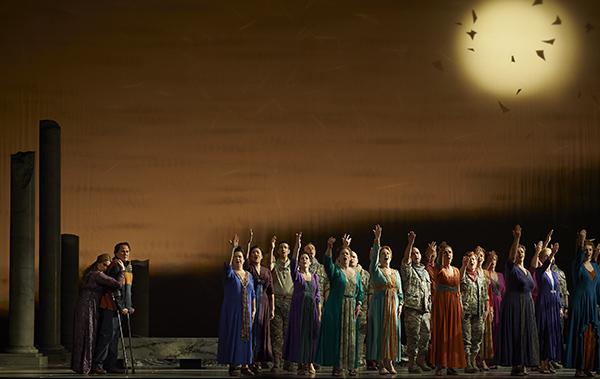
Alongside the personal excavation undertaken in the arias, Handel “places the huge choruses, where you get the power of citizens, and you say, ‘wait a minute, our whole society is in danger!’ You can’t just pathologize that person who just screamed in pain in the last aria.”
Though Sellars readily admits that the subject matter is challenging, he also emphasizes that “Handel believed that the first way to go into a difficult or dangerous place is with a lot of beauty. So the music is just ravishingly beautiful. It transmutes the suffering into another place and you don’t run away from it, but you go towards it.” In this way, Handel’s opera succeeds both as a precise, mimetically accurate diagnosis of the experience, and as a vehicle of the healing process itself.
Hercules runs until April 30 at the Four Seasons Centre for the Performing Arts, click here for tickets and more information.
Photos: (top) Alice Coote as Dejanira; (middle) (l-r) David Daniels as Lichas (in background), Richard Croft as Hyllus, Lucy Crowe as Iole and Kaleb Alexander as Soldier; (middle) Richard Croft and Lucy Crowe; (bottom) (at left) Alice Coote and Richard Croft. All production photos from the Canadian Opera Company’s Hercules, 2014 by Michael Cooper. Photo of Peter Sellars by Ruth Walz.
